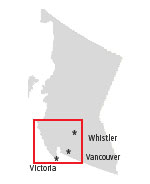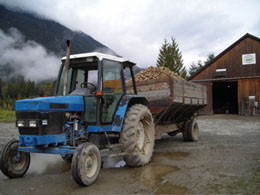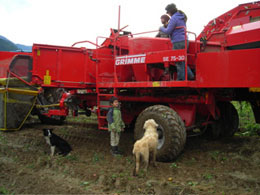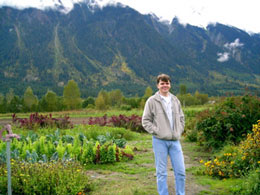Spud Valley
“Are you sure you want to do this?” That’s Araxi Executive Chef,
James Walt, looking across the muddy field where Bruce Miller,
owner of Across the Creek Organic farm, is harvesting potatoes.
It had been raining hard the previous two days and during
a break in the weather, James and I drove to Pemberton Valley
25 miles north of Whistler to check out Miller’s new German
Grimme potato harvester and to place an order for fresh organic
produce at nearby North Arm Farms.
Miller is on his tractor guiding the shiny new harvester. It
wasn’t that far, maybe a half mile down a gravel lane and then
across a dozen or so furrows, so sure, I’m game.
The gravel lane has a few mud puddles that soon
become more pond than puddle. We skirt around them into swampy
tall grass, and finally reach the field. We clomp our way across
the muddy furrows and Miller spots us. He stops his forward progress
and takes a break to visit with James. His two his farm hands
— a man and wife — try to clean the clumps of mud from the shiny
new machine. Their five-year old daughter and Miller’s dog play.
Granite coastal mountains jut abruptly from the valley floor,
surrounding the valley. Protected from harsh weather, its climate
is warm and dry in the summer and wet and mild in the winter,
ideal for a long and abundant growing season. Pemberton is referred
to as “spud valley” for its world-renowned organic virus-free
seed potato industry, which began in 1967. The isolation of the
valley makes it possible, through vigilant monitoring, testing
and regulating, to control any viruses, fungi and bacteria, including
the insects that spread them.
James, along with other savvy chefs in Whistler, depends on Pemberton
Valley for fresh greens, vegetables, fruit and, of course, potatoes.
Miller is James’ supplier dedicating 55 acres of his nearly 500-acre
family farm to eight varieties of organic potatoes, including
Sieglindes, blues, purples, Desirees, Yukon golds and fingerlings.
James reaches down and retrieves a fingerling, brushing off dirt
and rolling it in his palm. “Just about perfect,” he says. Miller
grins, nodding in agreement.
“I couldn’t harvest on a day like today with the old machine,”
says Miller, remarking that the new Grimme is picking up 98%
of the crop even in the sodden ground.
It’s time for us to head to North Arm Farms a few miles down
the road, so we leave Miller to his harvesting and make our way
back across the furrows. We decide to bypass the swamped lane,
broach a barbed-wire fence and walk through a pasture kept tidy
by cows that stare at us.
As we approach North Arm, dogs greet us and people wave. We browse
through the garden as though we’re in a huge outdoor supermarket,
checking on progress, munching crisp green beans and sampling
lettuces, lavender and mint. The organic farm is open to the
public with u-pick fields, animals for kids to pet, a bakery
and shelves full of homemade preserves, jams, jellies and pies.
In August, North Arm participates in Pemberton’s gastronomic
extravaganza, Feast of Fields, celebrating “buy local, in season”
sustainability and connectivity between farmer, chef and consumer.
The following day the culinary festivities continue with Slow
Food Cycle Sunday, a free, open-to-the-public cycle 50 kilometers
through Pemberton’s bountiful farmland sampling and supping.
James has placed his produce order and I’ve wandered the farm
on my own, but before we go, he stops me. “Can’t leave without
one of these,” he says, handing me a mini pecan pie. We sit outside
at a picnic table, licking our fingers from the sticky pies,
the gardens spreading before us, surrounding mountains including
snow-capped 8,000 foot Mt. Currie soaring above. “Good, huh?”
he says. Oh, yeah.
Adapted from my NW Palate Magazine
article 2008
www.feastoffields.com Sea
to Sky and www.slowfoodcyclesunday.com for information.
back to top
back to British Columbia overview



















